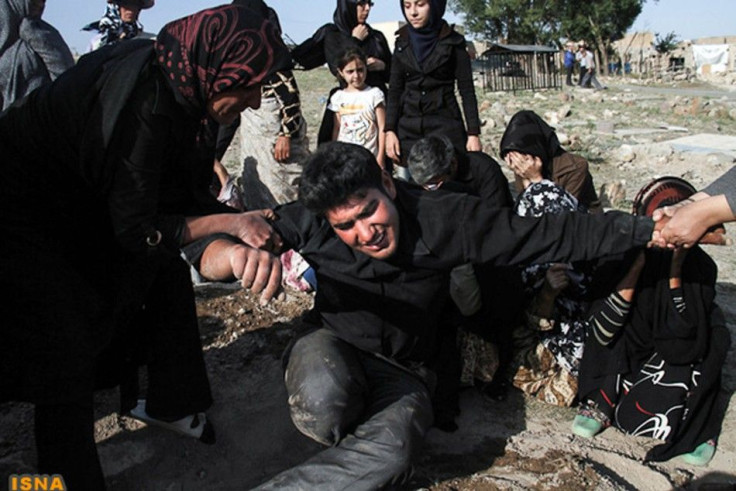Iran Rejects Foreign Aid To Help Earthquake Victims... Or Do They?

After two earthquakes rumbled through Northwest Iran last Saturday, leaving estimates of more than 300 dead, 3,000 injured, and 16,000 people displaced, Iran announced on Tuesday that they will welcome foreign aid for earthquake relief.
This does not, apparently, include aid from the U.S. Despite American vows to "speed aid" to the earthquake victims, Agence France Presse reported that the Iranian Interior Minister Hassan Ghadami told local news outlets that, "Iran did not accept the U.S. offer for sending humanitarian aid for quake survivors.
"We do not believe the U.S. put forward the offer in good faith. We are currently having a medicine supply crisis because of sanctions," Ghadami said.
"Do us a favor and lift the sanctions," he added.
Ghadami made his assertion just a day after both the Iranian parliament speaker Ali Larijani and Iranian Vice President Mohammad Reza Rahimi told the state news agency Irna that "now and under the current circumstances, we are ready to receive help from various countries," according to the BBC.
Also on Tuesday, the U.S. Treasury released a small guide outlining what licenses U.S. organizations must obtain to send aid to Iran.
Iran has also reportedly rejected offers of help from Germany, Russia, Taiwan, and Turkey. The Iranian Red Crescent has claimed they "don't need foreign assistance," and can "handle the disaster itself," according to Voice of America, but has accepted help from Qatar, Pakistan, Switzerland, and Azerbaijan.
As of Sunday, the LA Times reported, the Red Crescent seemed to be overwhelmed. A resident of one of the affected towns, Varzaqan, anonymously told the paper, "Official rescues halted or seem to have stopped, as there is no hope of [anyone] alive to be unearthed, and the number of Red Crescent rescue teams is not big enough and few of them are trained enough."
"Iran's mixed messages have been trouble," said David Elliott, Assistant Policy Director at the National Iranian American Council.
"Iran needs to get its act together to communicate clearly and consistently that it is going to put well-being of its citizens first and accept international aid offers."
"Unfortunately," Elliott continued, "It's not entirely uncommon for a country to reject aid from other countries, particularly in early moment of a disaster. Part of it is pride."
Elliott said it was very likely Iran would accept aid from non-profit organizations.
"What we're hoping," he said, "regardless of whether or not the U.S. provides official aid, is that people will still make individual contributions."
"What's important here is that politics shouldn't be a part of this," Elliott said, added that NIAC has been working with "a number" of relief organizations.
© Copyright IBTimes 2024. All rights reserved.






















